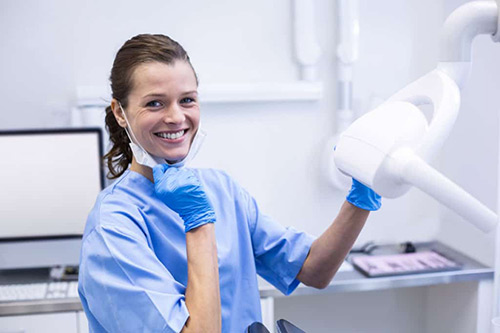How to Become a Dental Hygienist in California
There are several steps needed to become a dental hygienist.
The first step is to obtain the needed dental hygienist education. Most dental hygienists get an associate degree in dental hygiene or a bachelor’s degree. You may also pursue a master’s degree after obtaining an undergraduate degree, but it is uncommon. Typically careers in research, teaching or clinical practice in school health programs may require bachelor or master’s degrees, according to the BLS.11 Regardless of the level, you will need a dental hygiene degree to pursue these careers.
Programs through community colleges and technical schools typically take about 3 years to complete, including dental hygiene prerequisite courses. These programs provide laboratory, clinical and classroom instruction on the scientific basis for dental hygiene practice, skills and procedures required to provide dental hygiene services with high professional standards, and community health and research principles.
After completing your education, you then need to pass written and clinical exams to obtain your license. You will need to follow the criteria set forth by laws of your state or the state in which you want to work. Once you are a certified RDH, then you can start searching for dental hygiene jobs.
Do I Need to Be Certified to Be a Dental Hygienist?
To become a practicing dental hygienist, you must be licensed. All 50 states require dental hygienists to obtain a license to work with patients. The certified dental hygienist requirements can vary by state, so it’s important to find out early what your state mandates so you take the appropriate steps.
How Do I Obtain RDH Licensure?
In California, you can get licensed as a Registered Dental Hygienist by completing the Application to Practice Dental Hygiene through the Western Regional Examination Board (WREB).
To apply, you must meet the following requirements:12
- Be a graduate of a board approved and accredited Dental Hygiene program.
- Successfully complete a dental hygiene clinical examination accepted by the state of California.
- Complete approved courses in the administration of local anesthesia, and nitrous oxide. SJVC programs include this curriculum.
- Pass the National written examination.
 What to Look for in a Dental Hygiene School
What to Look for in a Dental Hygiene School
When selecting a dental hygienist college or school, it’s important to find a program that is properly accredited, employs quality instructors, and offers hands-on curriculum and informative classes.
It’s also important to find a school that fits into your budget. Review the tuition and fees required for each program before selecting a school.
One of the most important aspects you should look for in a program is the ability to properly prepare you for the licensure exams. You must pass the state’s licensing exam to be credentialed to work as a registered dental hygienist, so it’s critical to receive an education that gives you the knowledge you need.
After you pass your exam, you will need continuing education to maintain your license.
How Long is a Dental Hygienist Program?
According to the BLS, it can take up to 3 years to complete a dental hygienist program.14 This provides ample time to learn the required skills, get familiar with the anatomy of the teeth and gums, learn medical ethics, study periodontics, get hands-on experience and prepare for the license exams.
Can I Attend Dental Hygienist School Online?
If you need flexibility with your education, there are online dental hygiene associate degree programs. However, you cannot complete a CODA approved dental hygiene program online due to laboratory and clinical practice requirements. You can, however, choose to gain your initial education in-person and pursue higher education online. Online classes may be beneficial when earning a Dental Hygiene Bachelor of Science degree, or when taking continuing education classes for license requirements.
What Will I Learn in SJVC’s Dental Hygiene Courses?
San Joaquin Valley College’s Dental Hygiene program provides students with the knowledge they need to pass the licensure exams and gain successful employment as an RDH. As a dental hygienist school in California, you can earn an associate of science degree in about 16 months and are eligible to take the National Board written exam and a State/Regional Clinical Board exam for licensure as a Registered Dental Hygienist.
As a student of SJVC, you will benefit from:
- Experienced and compassionate faculty
- Excellent faculty to student ratios (1:5 in all clinical and most laboratory courses)
As a student at SJVC you will learn to:
- Use digital and traditional radiography, medical and dental history interviewing techniques, and clinical examination skills needed to assess patient’s dental hygiene treatment needs
- Use computerized practice management software and intra-oral cameras to record findings and manage treatment plans
- Provide preventive and therapeutic dental hygiene treatment with hand and ultrasonic instruments, including the use of antimicrobial agents and fluoride treatments.
- Modify treatment for patients with special needs
- Administer local anesthesia and nitrous oxide analgesia
- Prevent and manage dental emergencies common in dental settings. Place Dental Sealants and Interim Therapeutic Restorations (ITR)
To get admitted into this program, you first must complete the following prerequisite courses:
- General/Inorganic Chemistry (with wet lab)
- Organic/Biochemistry (with wet lab)
- General Microbiology (with wet lab)
- Human Physiology (with wet lab)
- Speech/Oral Communication
- Introduction to Sociology
- Human Anatomy (with wet lab)
- Writing and Composition
- General Psychology
- Intermediate Algebra or higher
To apply for the Dental Hygiene program at SJVC, all prerequisite courses must be completed at an institution accredited by an accrediting body recognized by the U.S. Department of Education. You must receive a minimum of a “C” grade and an overall GPA of 2.75 or higher.
Dental Hygienist Classes
SJVC offers a Dental Hygiene program to prepare you for a career as a dental hygienist, and to pass your licensure exams. The dental hygienist classes in our curriculum include:15
- Oral Radiology
- Dental Health Education
- Introduction to Clinic
- Periodontics 1
- General and Oral Pathology
- Patient Management and Geriatrics
- Clinical Seminar 1
- Community Oral Health
- Local Anesthesia
- Periodontics 2
- Applied Pharmacology
- Dental Materials
- Clinic Seminar 2
- Cultural Diversity and Healthcare
- Periodontics 3
- Clinical Seminar 3
- Nutrition
- Legal and Ethical Responsibilities
- Periodontics 4
- Oral Biology
- Head and Neck Anatomy
- Introduction to Clinic Lab
- Oral Radiology Lab
- Local Anesthesia Lab
- Clinical Seminar 1 Lab
- Clinical Practice 1
- Dental Materials Laboratory
- Community Oral Health Assessment and Program Planning
- Dental Practice Management
- Dental Hygiene Review
- Dental Hygiene Clinical Experience CR
 Prepare for a Career in Dental Hygiene With SJVC
Prepare for a Career in Dental Hygiene With SJVC
Becoming a dental hygienist can be a rewarding and fulfilling career. With numerous job opportunities available, it can also be a stable career with a comfortable salary. To prepare yourself for a career in this field, you need an exceptional dental hygienist school that offers an excellent curriculum and fully prepares you to pass your licensure exam to become a registered dental hygienist. SJVC’s program can give you the education and training you need to succeed.
Request information to learn more about our Dental Hygiene program.
Dental Hygienist FAQ
What Does a Dental Hygienist Do?
Dental hygienists perform essential services during a patient’s dental appointment. As an RDH you will assess a person’s oral health, perform preventive and therapeutic dental cleanings and place antimicrobial agents, sealants and interim therapeutic restorations. You will be using radiographs, local anesthesia, fluoride, and oral hygiene aids to educate patients on the importance of good oral health, assess their needs, and provide appropriate treatment.
How Long Does It Take to Become a Dental Hygienist?
At SJVC, it can take about 16 months to complete the Dental Hygiene program and achieve an associate of science degree. You are eligible to take national and regional board exams after completing the program.
What Requirements Do I Need to Meet to Become a Dental Hygienist?
To become a dental hygienist, you need to first meet the education requirements. This can include obtaining an associate or bachelor’s degree in dental hygiene. In addition to getting a degree, you also must pass licensure exams. A license is required in every state to become a practicing dental hygienist.
What Dental Hygienist Prerequisites Must I Meet?
At SJVC, to apply for the Dental Hygiene program you must take a required list of core classes at an accredited institution, including courses in Chemistry, Microbiology, Physiology, Psychology, Sociology, and Mathematics. You must receive at least a “C” grade and an overall GPA of 2.75 or higher.
 What to Look for in a Dental Hygiene School
What to Look for in a Dental Hygiene School Prepare for a Career in Dental Hygiene With SJVC
Prepare for a Career in Dental Hygiene With SJVC